HRM Assessment - Universal Basic Income and its Relationship with HR
VerifiedAdded on 2023/06/12
|15
|4769
|129
AI Summary
This assessment explores the concept of Universal Basic Income (UBI) and its relevance as a government programme. It also analyzes the relationship between UBI and HR, including the roles played by HR in implementing UBI. The assessment also discusses the benefits of motivating employees and how HR can achieve this.
Contribute Materials
Your contribution can guide someone’s learning journey. Share your
documents today.
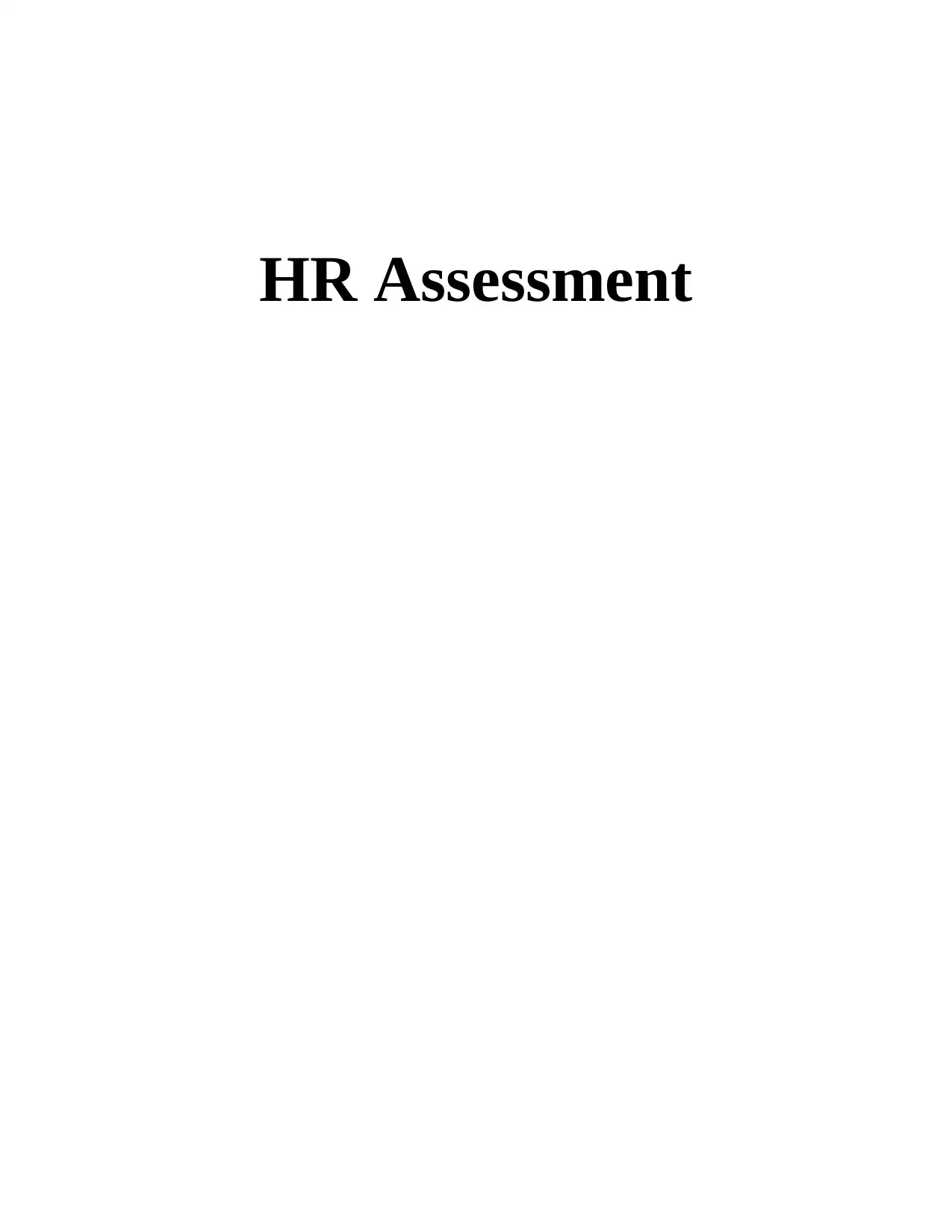
HR Assessment
Secure Best Marks with AI Grader
Need help grading? Try our AI Grader for instant feedback on your assignments.

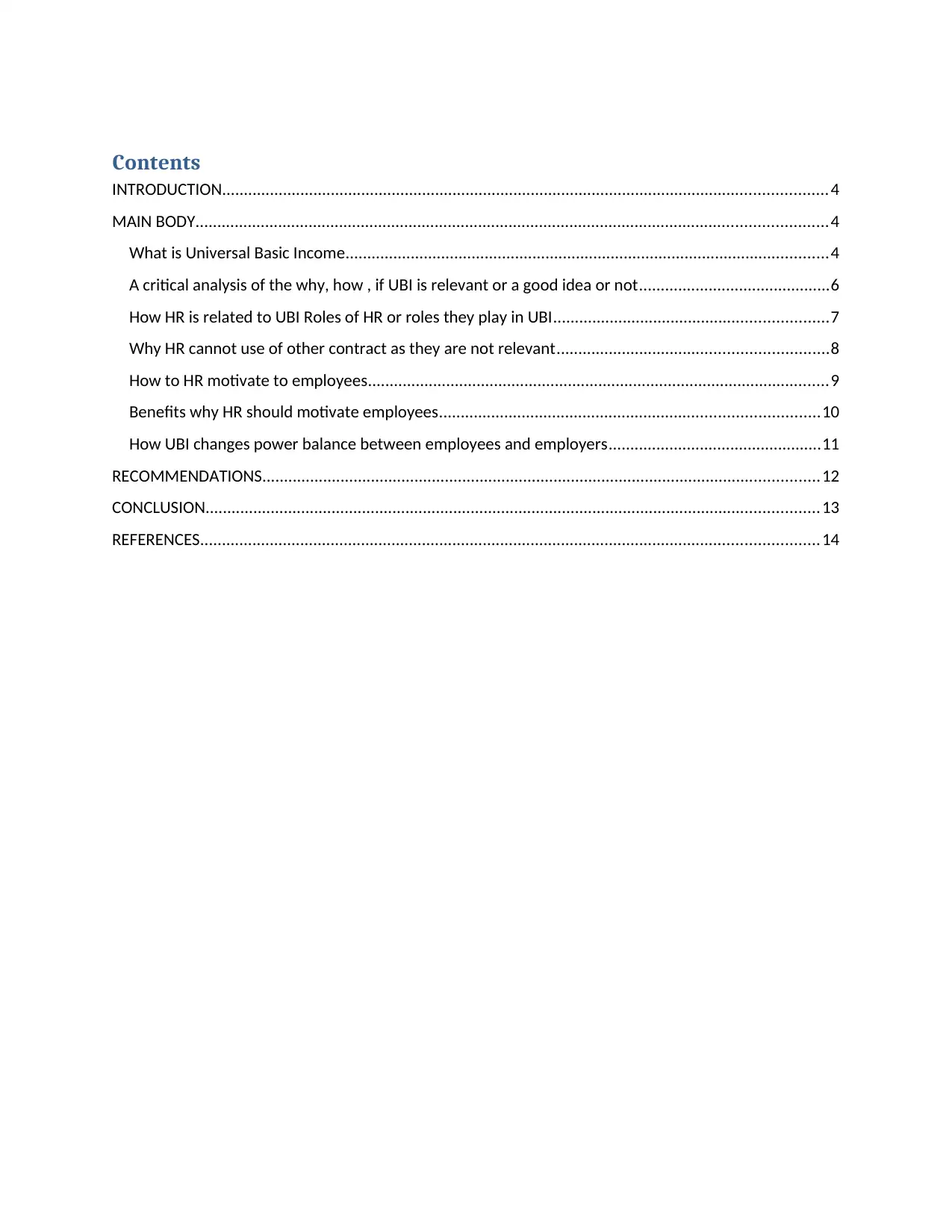
Contents
INTRODUCTION...........................................................................................................................................4
MAIN BODY.................................................................................................................................................4
What is Universal Basic Income...............................................................................................................4
A critical analysis of the why, how , if UBI is relevant or a good idea or not............................................6
How HR is related to UBI Roles of HR or roles they play in UBI...............................................................7
Why HR cannot use of other contract as they are not relevant..............................................................8
How to HR motivate to employees..........................................................................................................9
Benefits why HR should motivate employees.......................................................................................10
How UBI changes power balance between employees and employers.................................................11
RECOMMENDATIONS................................................................................................................................12
CONCLUSION.............................................................................................................................................13
REFERENCES..............................................................................................................................................14
INTRODUCTION...........................................................................................................................................4
MAIN BODY.................................................................................................................................................4
What is Universal Basic Income...............................................................................................................4
A critical analysis of the why, how , if UBI is relevant or a good idea or not............................................6
How HR is related to UBI Roles of HR or roles they play in UBI...............................................................7
Why HR cannot use of other contract as they are not relevant..............................................................8
How to HR motivate to employees..........................................................................................................9
Benefits why HR should motivate employees.......................................................................................10
How UBI changes power balance between employees and employers.................................................11
RECOMMENDATIONS................................................................................................................................12
CONCLUSION.............................................................................................................................................13
REFERENCES..............................................................................................................................................14
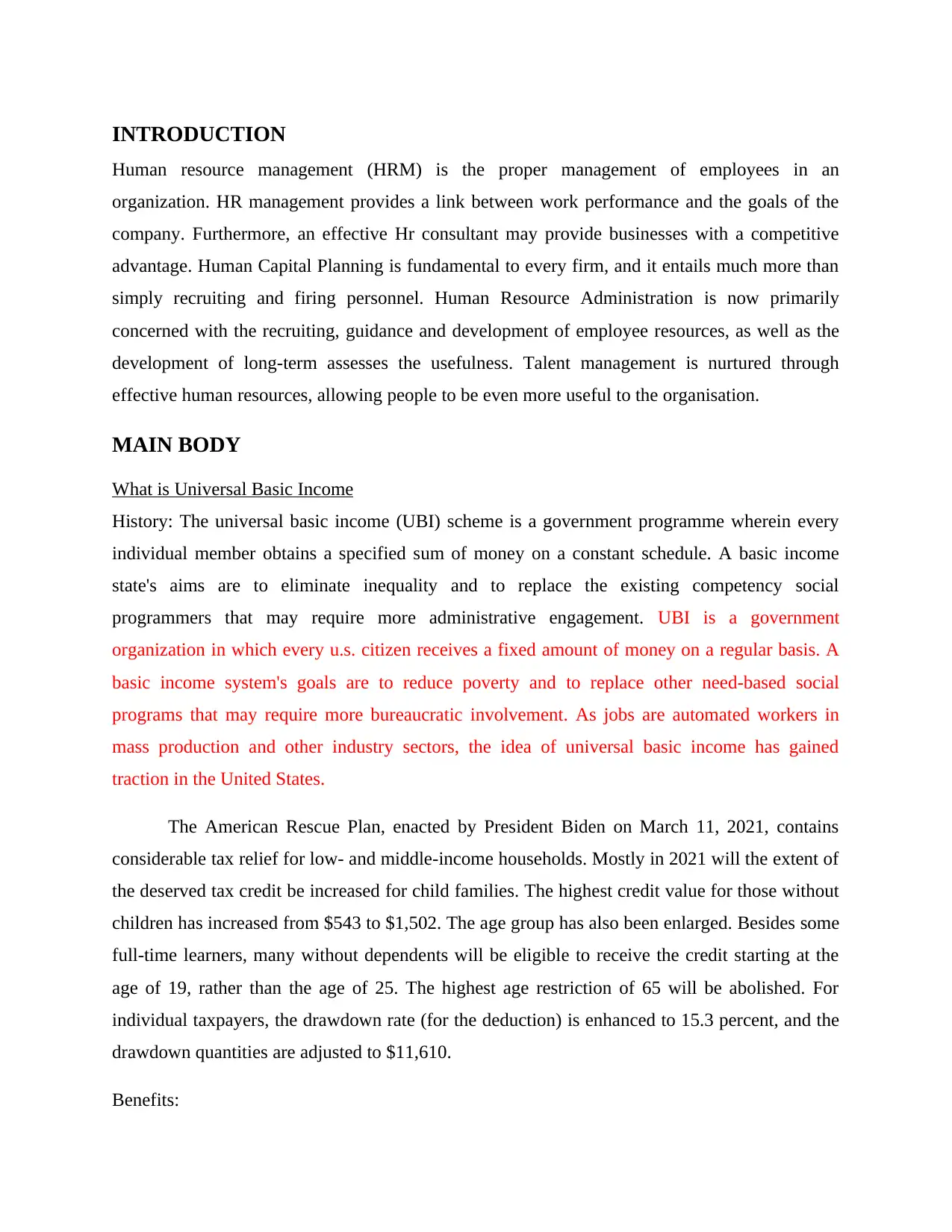
INTRODUCTION
Human resource management (HRM) is the proper management of employees in an
organization. HR management provides a link between work performance and the goals of the
company. Furthermore, an effective Hr consultant may provide businesses with a competitive
advantage. Human Capital Planning is fundamental to every firm, and it entails much more than
simply recruiting and firing personnel. Human Resource Administration is now primarily
concerned with the recruiting, guidance and development of employee resources, as well as the
development of long-term assesses the usefulness. Talent management is nurtured through
effective human resources, allowing people to be even more useful to the organisation.
MAIN BODY
What is Universal Basic Income
History: The universal basic income (UBI) scheme is a government programme wherein every
individual member obtains a specified sum of money on a constant schedule. A basic income
state's aims are to eliminate inequality and to replace the existing competency social
programmers that may require more administrative engagement. UBI is a government
organization in which every u.s. citizen receives a fixed amount of money on a regular basis. A
basic income system's goals are to reduce poverty and to replace other need-based social
programs that may require more bureaucratic involvement. As jobs are automated workers in
mass production and other industry sectors, the idea of universal basic income has gained
traction in the United States.
The American Rescue Plan, enacted by President Biden on March 11, 2021, contains
considerable tax relief for low- and middle-income households. Mostly in 2021 will the extent of
the deserved tax credit be increased for child families. The highest credit value for those without
children has increased from $543 to $1,502. The age group has also been enlarged. Besides some
full-time learners, many without dependents will be eligible to receive the credit starting at the
age of 19, rather than the age of 25. The highest age restriction of 65 will be abolished. For
individual taxpayers, the drawdown rate (for the deduction) is enhanced to 15.3 percent, and the
drawdown quantities are adjusted to $11,610.
Benefits:
Human resource management (HRM) is the proper management of employees in an
organization. HR management provides a link between work performance and the goals of the
company. Furthermore, an effective Hr consultant may provide businesses with a competitive
advantage. Human Capital Planning is fundamental to every firm, and it entails much more than
simply recruiting and firing personnel. Human Resource Administration is now primarily
concerned with the recruiting, guidance and development of employee resources, as well as the
development of long-term assesses the usefulness. Talent management is nurtured through
effective human resources, allowing people to be even more useful to the organisation.
MAIN BODY
What is Universal Basic Income
History: The universal basic income (UBI) scheme is a government programme wherein every
individual member obtains a specified sum of money on a constant schedule. A basic income
state's aims are to eliminate inequality and to replace the existing competency social
programmers that may require more administrative engagement. UBI is a government
organization in which every u.s. citizen receives a fixed amount of money on a regular basis. A
basic income system's goals are to reduce poverty and to replace other need-based social
programs that may require more bureaucratic involvement. As jobs are automated workers in
mass production and other industry sectors, the idea of universal basic income has gained
traction in the United States.
The American Rescue Plan, enacted by President Biden on March 11, 2021, contains
considerable tax relief for low- and middle-income households. Mostly in 2021 will the extent of
the deserved tax credit be increased for child families. The highest credit value for those without
children has increased from $543 to $1,502. The age group has also been enlarged. Besides some
full-time learners, many without dependents will be eligible to receive the credit starting at the
age of 19, rather than the age of 25. The highest age restriction of 65 will be abolished. For
individual taxpayers, the drawdown rate (for the deduction) is enhanced to 15.3 percent, and the
drawdown quantities are adjusted to $11,610.
Benefits:
Secure Best Marks with AI Grader
Need help grading? Try our AI Grader for instant feedback on your assignments.
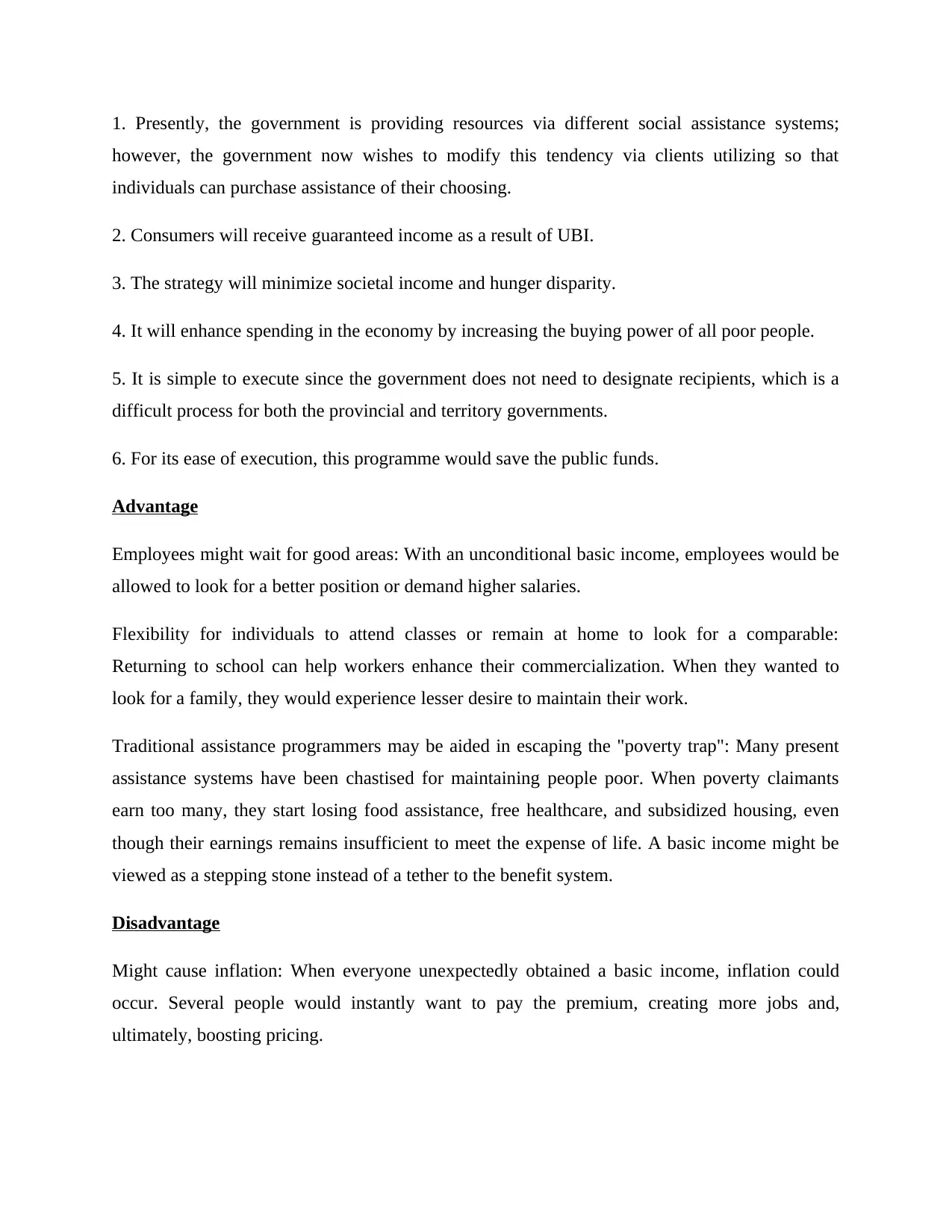
1. Presently, the government is providing resources via different social assistance systems;
however, the government now wishes to modify this tendency via clients utilizing so that
individuals can purchase assistance of their choosing.
2. Consumers will receive guaranteed income as a result of UBI.
3. The strategy will minimize societal income and hunger disparity.
4. It will enhance spending in the economy by increasing the buying power of all poor people.
5. It is simple to execute since the government does not need to designate recipients, which is a
difficult process for both the provincial and territory governments.
6. For its ease of execution, this programme would save the public funds.
Advantage
Employees might wait for good areas: With an unconditional basic income, employees would be
allowed to look for a better position or demand higher salaries.
Flexibility for individuals to attend classes or remain at home to look for a comparable:
Returning to school can help workers enhance their commercialization. When they wanted to
look for a family, they would experience lesser desire to maintain their work.
Traditional assistance programmers may be aided in escaping the "poverty trap": Many present
assistance systems have been chastised for maintaining people poor. When poverty claimants
earn too many, they start losing food assistance, free healthcare, and subsidized housing, even
though their earnings remains insufficient to meet the expense of life. A basic income might be
viewed as a stepping stone instead of a tether to the benefit system.
Disadvantage
Might cause inflation: When everyone unexpectedly obtained a basic income, inflation could
occur. Several people would instantly want to pay the premium, creating more jobs and,
ultimately, boosting pricing.
however, the government now wishes to modify this tendency via clients utilizing so that
individuals can purchase assistance of their choosing.
2. Consumers will receive guaranteed income as a result of UBI.
3. The strategy will minimize societal income and hunger disparity.
4. It will enhance spending in the economy by increasing the buying power of all poor people.
5. It is simple to execute since the government does not need to designate recipients, which is a
difficult process for both the provincial and territory governments.
6. For its ease of execution, this programme would save the public funds.
Advantage
Employees might wait for good areas: With an unconditional basic income, employees would be
allowed to look for a better position or demand higher salaries.
Flexibility for individuals to attend classes or remain at home to look for a comparable:
Returning to school can help workers enhance their commercialization. When they wanted to
look for a family, they would experience lesser desire to maintain their work.
Traditional assistance programmers may be aided in escaping the "poverty trap": Many present
assistance systems have been chastised for maintaining people poor. When poverty claimants
earn too many, they start losing food assistance, free healthcare, and subsidized housing, even
though their earnings remains insufficient to meet the expense of life. A basic income might be
viewed as a stepping stone instead of a tether to the benefit system.
Disadvantage
Might cause inflation: When everyone unexpectedly obtained a basic income, inflation could
occur. Several people would instantly want to pay the premium, creating more jobs and,
ultimately, boosting pricing.
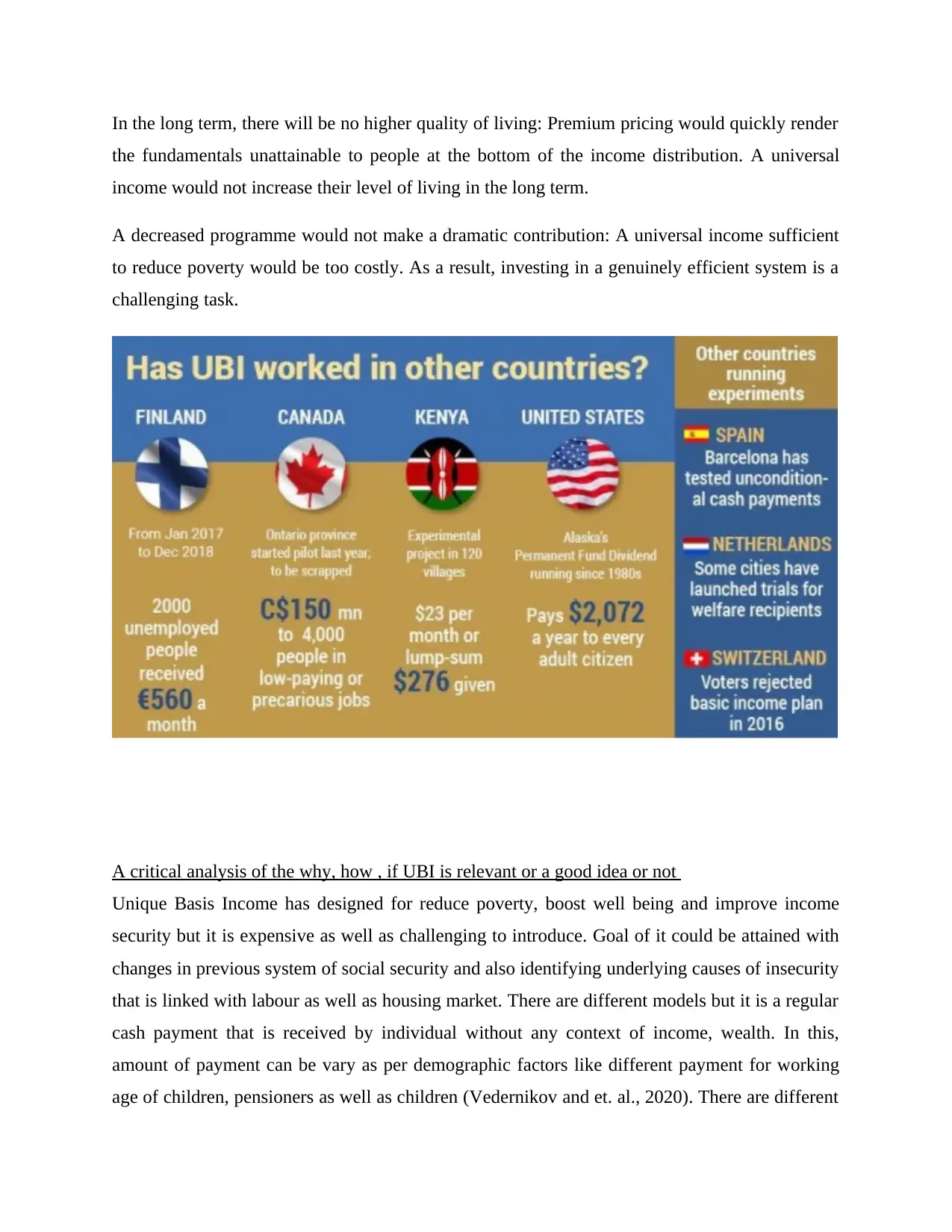
In the long term, there will be no higher quality of living: Premium pricing would quickly render
the fundamentals unattainable to people at the bottom of the income distribution. A universal
income would not increase their level of living in the long term.
A decreased programme would not make a dramatic contribution: A universal income sufficient
to reduce poverty would be too costly. As a result, investing in a genuinely efficient system is a
challenging task.
A critical analysis of the why, how , if UBI is relevant or a good idea or not
Unique Basis Income has designed for reduce poverty, boost well being and improve income
security but it is expensive as well as challenging to introduce. Goal of it could be attained with
changes in previous system of social security and also identifying underlying causes of insecurity
that is linked with labour as well as housing market. There are different models but it is a regular
cash payment that is received by individual without any context of income, wealth. In this,
amount of payment can be vary as per demographic factors like different payment for working
age of children, pensioners as well as children (Vedernikov and et. al., 2020). There are different
the fundamentals unattainable to people at the bottom of the income distribution. A universal
income would not increase their level of living in the long term.
A decreased programme would not make a dramatic contribution: A universal income sufficient
to reduce poverty would be too costly. As a result, investing in a genuinely efficient system is a
challenging task.
A critical analysis of the why, how , if UBI is relevant or a good idea or not
Unique Basis Income has designed for reduce poverty, boost well being and improve income
security but it is expensive as well as challenging to introduce. Goal of it could be attained with
changes in previous system of social security and also identifying underlying causes of insecurity
that is linked with labour as well as housing market. There are different models but it is a regular
cash payment that is received by individual without any context of income, wealth. In this,
amount of payment can be vary as per demographic factors like different payment for working
age of children, pensioners as well as children (Vedernikov and et. al., 2020). There are different
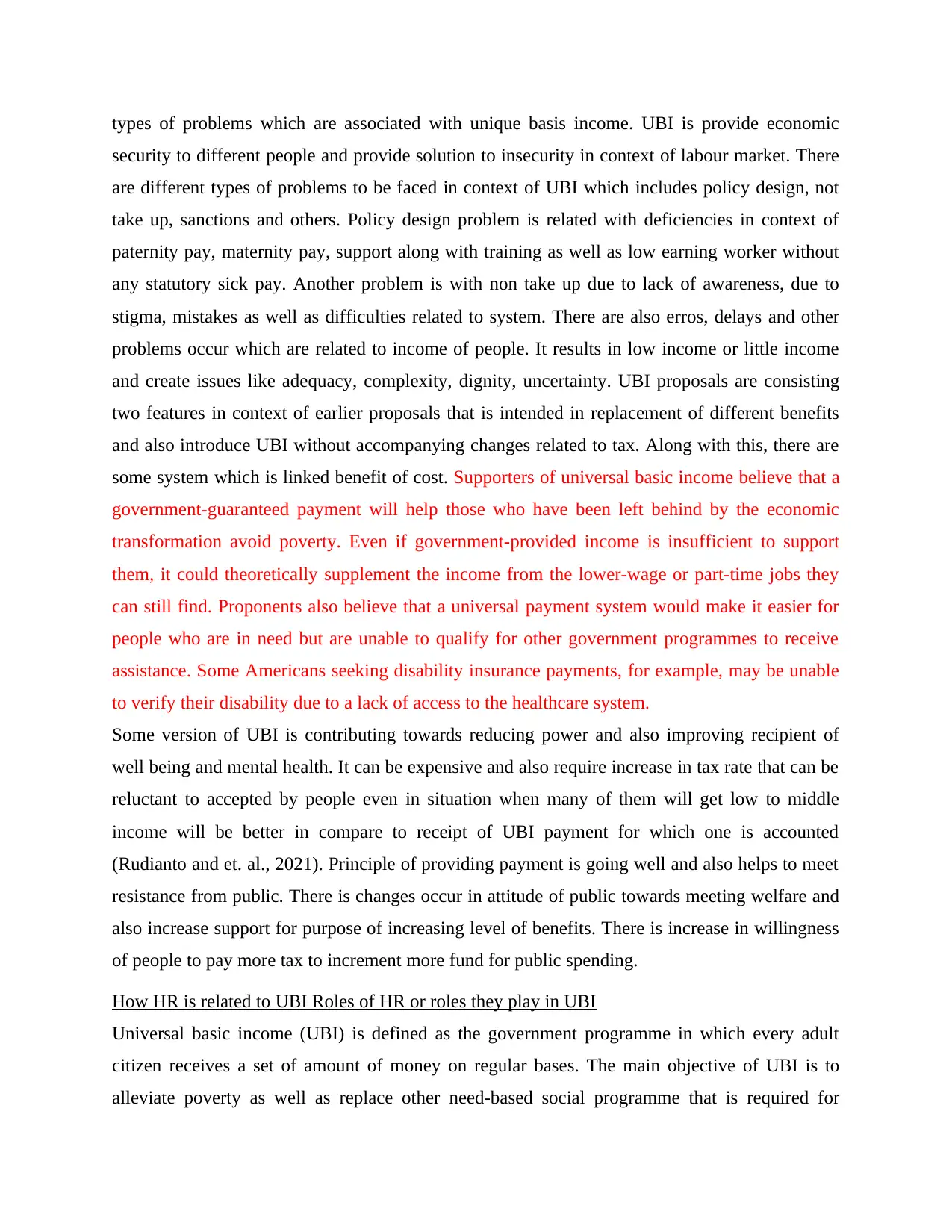
types of problems which are associated with unique basis income. UBI is provide economic
security to different people and provide solution to insecurity in context of labour market. There
are different types of problems to be faced in context of UBI which includes policy design, not
take up, sanctions and others. Policy design problem is related with deficiencies in context of
paternity pay, maternity pay, support along with training as well as low earning worker without
any statutory sick pay. Another problem is with non take up due to lack of awareness, due to
stigma, mistakes as well as difficulties related to system. There are also erros, delays and other
problems occur which are related to income of people. It results in low income or little income
and create issues like adequacy, complexity, dignity, uncertainty. UBI proposals are consisting
two features in context of earlier proposals that is intended in replacement of different benefits
and also introduce UBI without accompanying changes related to tax. Along with this, there are
some system which is linked benefit of cost. Supporters of universal basic income believe that a
government-guaranteed payment will help those who have been left behind by the economic
transformation avoid poverty. Even if government-provided income is insufficient to support
them, it could theoretically supplement the income from the lower-wage or part-time jobs they
can still find. Proponents also believe that a universal payment system would make it easier for
people who are in need but are unable to qualify for other government programmes to receive
assistance. Some Americans seeking disability insurance payments, for example, may be unable
to verify their disability due to a lack of access to the healthcare system.
Some version of UBI is contributing towards reducing power and also improving recipient of
well being and mental health. It can be expensive and also require increase in tax rate that can be
reluctant to accepted by people even in situation when many of them will get low to middle
income will be better in compare to receipt of UBI payment for which one is accounted
(Rudianto and et. al., 2021). Principle of providing payment is going well and also helps to meet
resistance from public. There is changes occur in attitude of public towards meeting welfare and
also increase support for purpose of increasing level of benefits. There is increase in willingness
of people to pay more tax to increment more fund for public spending.
How HR is related to UBI Roles of HR or roles they play in UBI
Universal basic income (UBI) is defined as the government programme in which every adult
citizen receives a set of amount of money on regular bases. The main objective of UBI is to
alleviate poverty as well as replace other need-based social programme that is required for
security to different people and provide solution to insecurity in context of labour market. There
are different types of problems to be faced in context of UBI which includes policy design, not
take up, sanctions and others. Policy design problem is related with deficiencies in context of
paternity pay, maternity pay, support along with training as well as low earning worker without
any statutory sick pay. Another problem is with non take up due to lack of awareness, due to
stigma, mistakes as well as difficulties related to system. There are also erros, delays and other
problems occur which are related to income of people. It results in low income or little income
and create issues like adequacy, complexity, dignity, uncertainty. UBI proposals are consisting
two features in context of earlier proposals that is intended in replacement of different benefits
and also introduce UBI without accompanying changes related to tax. Along with this, there are
some system which is linked benefit of cost. Supporters of universal basic income believe that a
government-guaranteed payment will help those who have been left behind by the economic
transformation avoid poverty. Even if government-provided income is insufficient to support
them, it could theoretically supplement the income from the lower-wage or part-time jobs they
can still find. Proponents also believe that a universal payment system would make it easier for
people who are in need but are unable to qualify for other government programmes to receive
assistance. Some Americans seeking disability insurance payments, for example, may be unable
to verify their disability due to a lack of access to the healthcare system.
Some version of UBI is contributing towards reducing power and also improving recipient of
well being and mental health. It can be expensive and also require increase in tax rate that can be
reluctant to accepted by people even in situation when many of them will get low to middle
income will be better in compare to receipt of UBI payment for which one is accounted
(Rudianto and et. al., 2021). Principle of providing payment is going well and also helps to meet
resistance from public. There is changes occur in attitude of public towards meeting welfare and
also increase support for purpose of increasing level of benefits. There is increase in willingness
of people to pay more tax to increment more fund for public spending.
How HR is related to UBI Roles of HR or roles they play in UBI
Universal basic income (UBI) is defined as the government programme in which every adult
citizen receives a set of amount of money on regular bases. The main objective of UBI is to
alleviate poverty as well as replace other need-based social programme that is required for
Paraphrase This Document
Need a fresh take? Get an instant paraphrase of this document with our AI Paraphraser
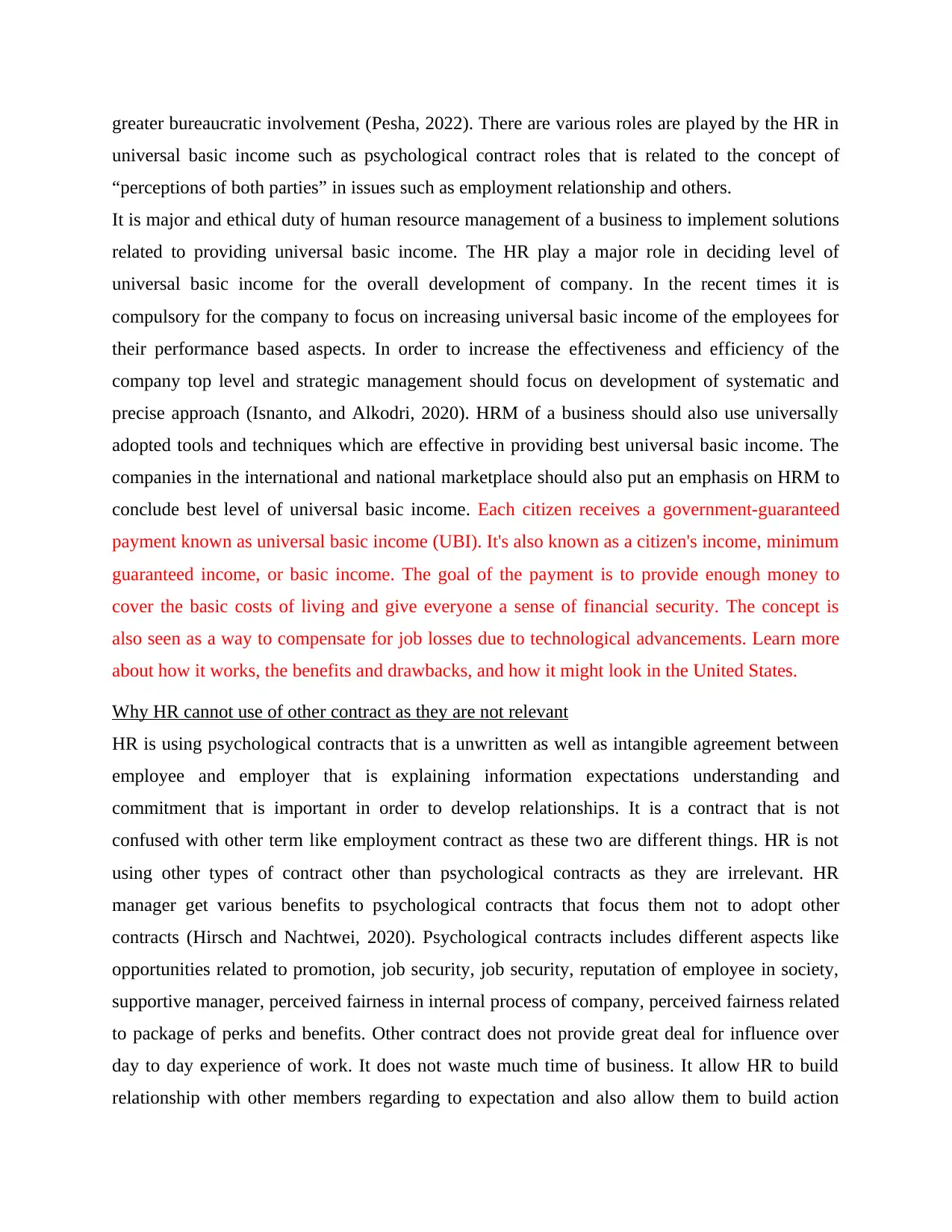
greater bureaucratic involvement (Pesha, 2022). There are various roles are played by the HR in
universal basic income such as psychological contract roles that is related to the concept of
“perceptions of both parties” in issues such as employment relationship and others.
It is major and ethical duty of human resource management of a business to implement solutions
related to providing universal basic income. The HR play a major role in deciding level of
universal basic income for the overall development of company. In the recent times it is
compulsory for the company to focus on increasing universal basic income of the employees for
their performance based aspects. In order to increase the effectiveness and efficiency of the
company top level and strategic management should focus on development of systematic and
precise approach (Isnanto, and Alkodri, 2020). HRM of a business should also use universally
adopted tools and techniques which are effective in providing best universal basic income. The
companies in the international and national marketplace should also put an emphasis on HRM to
conclude best level of universal basic income. Each citizen receives a government-guaranteed
payment known as universal basic income (UBI). It's also known as a citizen's income, minimum
guaranteed income, or basic income. The goal of the payment is to provide enough money to
cover the basic costs of living and give everyone a sense of financial security. The concept is
also seen as a way to compensate for job losses due to technological advancements. Learn more
about how it works, the benefits and drawbacks, and how it might look in the United States.
Why HR cannot use of other contract as they are not relevant
HR is using psychological contracts that is a unwritten as well as intangible agreement between
employee and employer that is explaining information expectations understanding and
commitment that is important in order to develop relationships. It is a contract that is not
confused with other term like employment contract as these two are different things. HR is not
using other types of contract other than psychological contracts as they are irrelevant. HR
manager get various benefits to psychological contracts that focus them not to adopt other
contracts (Hirsch and Nachtwei, 2020). Psychological contracts includes different aspects like
opportunities related to promotion, job security, job security, reputation of employee in society,
supportive manager, perceived fairness in internal process of company, perceived fairness related
to package of perks and benefits. Other contract does not provide great deal for influence over
day to day experience of work. It does not waste much time of business. It allow HR to build
relationship with other members regarding to expectation and also allow them to build action
universal basic income such as psychological contract roles that is related to the concept of
“perceptions of both parties” in issues such as employment relationship and others.
It is major and ethical duty of human resource management of a business to implement solutions
related to providing universal basic income. The HR play a major role in deciding level of
universal basic income for the overall development of company. In the recent times it is
compulsory for the company to focus on increasing universal basic income of the employees for
their performance based aspects. In order to increase the effectiveness and efficiency of the
company top level and strategic management should focus on development of systematic and
precise approach (Isnanto, and Alkodri, 2020). HRM of a business should also use universally
adopted tools and techniques which are effective in providing best universal basic income. The
companies in the international and national marketplace should also put an emphasis on HRM to
conclude best level of universal basic income. Each citizen receives a government-guaranteed
payment known as universal basic income (UBI). It's also known as a citizen's income, minimum
guaranteed income, or basic income. The goal of the payment is to provide enough money to
cover the basic costs of living and give everyone a sense of financial security. The concept is
also seen as a way to compensate for job losses due to technological advancements. Learn more
about how it works, the benefits and drawbacks, and how it might look in the United States.
Why HR cannot use of other contract as they are not relevant
HR is using psychological contracts that is a unwritten as well as intangible agreement between
employee and employer that is explaining information expectations understanding and
commitment that is important in order to develop relationships. It is a contract that is not
confused with other term like employment contract as these two are different things. HR is not
using other types of contract other than psychological contracts as they are irrelevant. HR
manager get various benefits to psychological contracts that focus them not to adopt other
contracts (Hirsch and Nachtwei, 2020). Psychological contracts includes different aspects like
opportunities related to promotion, job security, job security, reputation of employee in society,
supportive manager, perceived fairness in internal process of company, perceived fairness related
to package of perks and benefits. Other contract does not provide great deal for influence over
day to day experience of work. It does not waste much time of business. It allow HR to build
relationship with other members regarding to expectation and also allow them to build action
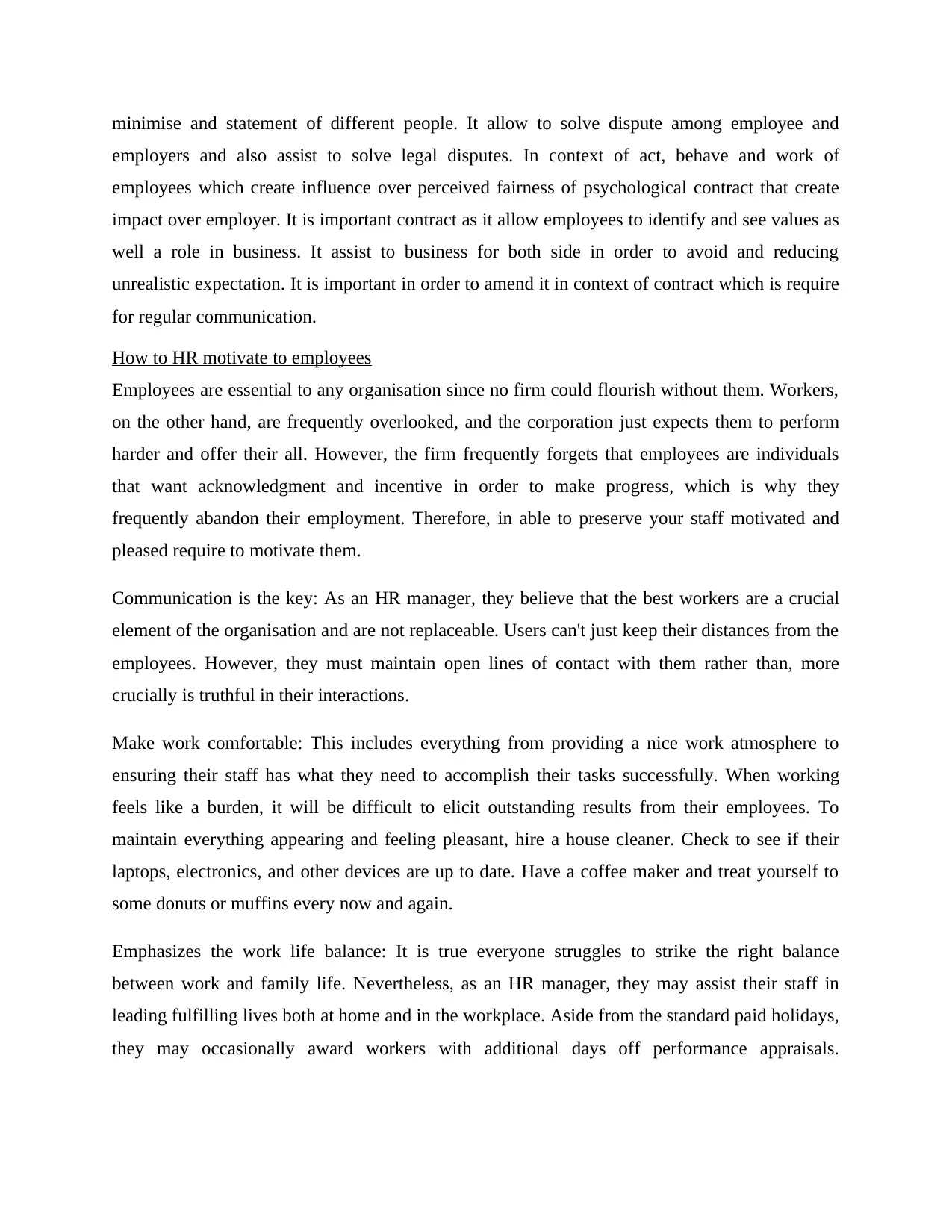
minimise and statement of different people. It allow to solve dispute among employee and
employers and also assist to solve legal disputes. In context of act, behave and work of
employees which create influence over perceived fairness of psychological contract that create
impact over employer. It is important contract as it allow employees to identify and see values as
well a role in business. It assist to business for both side in order to avoid and reducing
unrealistic expectation. It is important in order to amend it in context of contract which is require
for regular communication.
How to HR motivate to employees
Employees are essential to any organisation since no firm could flourish without them. Workers,
on the other hand, are frequently overlooked, and the corporation just expects them to perform
harder and offer their all. However, the firm frequently forgets that employees are individuals
that want acknowledgment and incentive in order to make progress, which is why they
frequently abandon their employment. Therefore, in able to preserve your staff motivated and
pleased require to motivate them.
Communication is the key: As an HR manager, they believe that the best workers are a crucial
element of the organisation and are not replaceable. Users can't just keep their distances from the
employees. However, they must maintain open lines of contact with them rather than, more
crucially is truthful in their interactions.
Make work comfortable: This includes everything from providing a nice work atmosphere to
ensuring their staff has what they need to accomplish their tasks successfully. When working
feels like a burden, it will be difficult to elicit outstanding results from their employees. To
maintain everything appearing and feeling pleasant, hire a house cleaner. Check to see if their
laptops, electronics, and other devices are up to date. Have a coffee maker and treat yourself to
some donuts or muffins every now and again.
Emphasizes the work life balance: It is true everyone struggles to strike the right balance
between work and family life. Nevertheless, as an HR manager, they may assist their staff in
leading fulfilling lives both at home and in the workplace. Aside from the standard paid holidays,
they may occasionally award workers with additional days off performance appraisals.
employers and also assist to solve legal disputes. In context of act, behave and work of
employees which create influence over perceived fairness of psychological contract that create
impact over employer. It is important contract as it allow employees to identify and see values as
well a role in business. It assist to business for both side in order to avoid and reducing
unrealistic expectation. It is important in order to amend it in context of contract which is require
for regular communication.
How to HR motivate to employees
Employees are essential to any organisation since no firm could flourish without them. Workers,
on the other hand, are frequently overlooked, and the corporation just expects them to perform
harder and offer their all. However, the firm frequently forgets that employees are individuals
that want acknowledgment and incentive in order to make progress, which is why they
frequently abandon their employment. Therefore, in able to preserve your staff motivated and
pleased require to motivate them.
Communication is the key: As an HR manager, they believe that the best workers are a crucial
element of the organisation and are not replaceable. Users can't just keep their distances from the
employees. However, they must maintain open lines of contact with them rather than, more
crucially is truthful in their interactions.
Make work comfortable: This includes everything from providing a nice work atmosphere to
ensuring their staff has what they need to accomplish their tasks successfully. When working
feels like a burden, it will be difficult to elicit outstanding results from their employees. To
maintain everything appearing and feeling pleasant, hire a house cleaner. Check to see if their
laptops, electronics, and other devices are up to date. Have a coffee maker and treat yourself to
some donuts or muffins every now and again.
Emphasizes the work life balance: It is true everyone struggles to strike the right balance
between work and family life. Nevertheless, as an HR manager, they may assist their staff in
leading fulfilling lives both at home and in the workplace. Aside from the standard paid holidays,
they may occasionally award workers with additional days off performance appraisals.
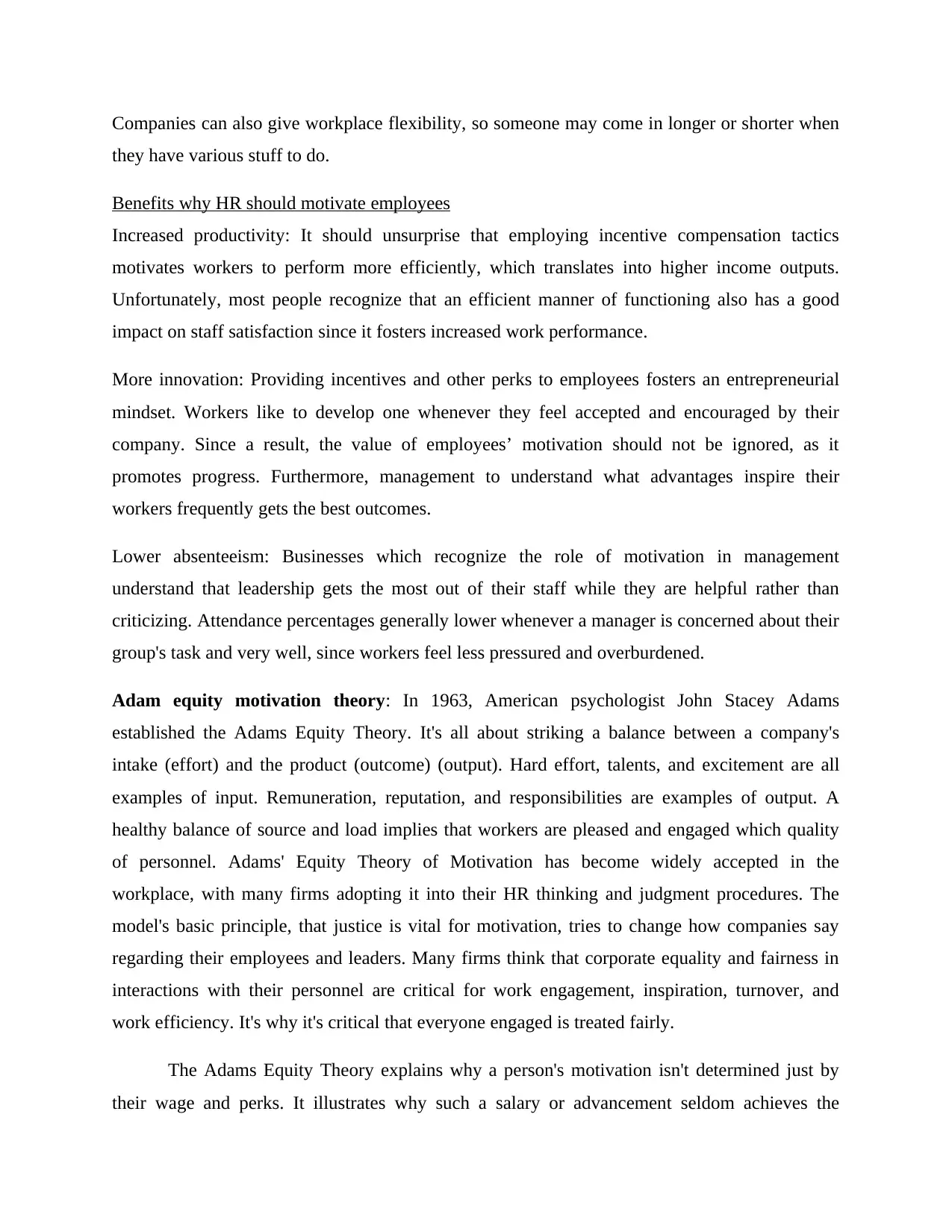
Companies can also give workplace flexibility, so someone may come in longer or shorter when
they have various stuff to do.
Benefits why HR should motivate employees
Increased productivity: It should unsurprise that employing incentive compensation tactics
motivates workers to perform more efficiently, which translates into higher income outputs.
Unfortunately, most people recognize that an efficient manner of functioning also has a good
impact on staff satisfaction since it fosters increased work performance.
More innovation: Providing incentives and other perks to employees fosters an entrepreneurial
mindset. Workers like to develop one whenever they feel accepted and encouraged by their
company. Since a result, the value of employees’ motivation should not be ignored, as it
promotes progress. Furthermore, management to understand what advantages inspire their
workers frequently gets the best outcomes.
Lower absenteeism: Businesses which recognize the role of motivation in management
understand that leadership gets the most out of their staff while they are helpful rather than
criticizing. Attendance percentages generally lower whenever a manager is concerned about their
group's task and very well, since workers feel less pressured and overburdened.
Adam equity motivation theory: In 1963, American psychologist John Stacey Adams
established the Adams Equity Theory. It's all about striking a balance between a company's
intake (effort) and the product (outcome) (output). Hard effort, talents, and excitement are all
examples of input. Remuneration, reputation, and responsibilities are examples of output. A
healthy balance of source and load implies that workers are pleased and engaged which quality
of personnel. Adams' Equity Theory of Motivation has become widely accepted in the
workplace, with many firms adopting it into their HR thinking and judgment procedures. The
model's basic principle, that justice is vital for motivation, tries to change how companies say
regarding their employees and leaders. Many firms think that corporate equality and fairness in
interactions with their personnel are critical for work engagement, inspiration, turnover, and
work efficiency. It's why it's critical that everyone engaged is treated fairly.
The Adams Equity Theory explains why a person's motivation isn't determined just by
their wage and perks. It illustrates why such a salary or advancement seldom achieves the
they have various stuff to do.
Benefits why HR should motivate employees
Increased productivity: It should unsurprise that employing incentive compensation tactics
motivates workers to perform more efficiently, which translates into higher income outputs.
Unfortunately, most people recognize that an efficient manner of functioning also has a good
impact on staff satisfaction since it fosters increased work performance.
More innovation: Providing incentives and other perks to employees fosters an entrepreneurial
mindset. Workers like to develop one whenever they feel accepted and encouraged by their
company. Since a result, the value of employees’ motivation should not be ignored, as it
promotes progress. Furthermore, management to understand what advantages inspire their
workers frequently gets the best outcomes.
Lower absenteeism: Businesses which recognize the role of motivation in management
understand that leadership gets the most out of their staff while they are helpful rather than
criticizing. Attendance percentages generally lower whenever a manager is concerned about their
group's task and very well, since workers feel less pressured and overburdened.
Adam equity motivation theory: In 1963, American psychologist John Stacey Adams
established the Adams Equity Theory. It's all about striking a balance between a company's
intake (effort) and the product (outcome) (output). Hard effort, talents, and excitement are all
examples of input. Remuneration, reputation, and responsibilities are examples of output. A
healthy balance of source and load implies that workers are pleased and engaged which quality
of personnel. Adams' Equity Theory of Motivation has become widely accepted in the
workplace, with many firms adopting it into their HR thinking and judgment procedures. The
model's basic principle, that justice is vital for motivation, tries to change how companies say
regarding their employees and leaders. Many firms think that corporate equality and fairness in
interactions with their personnel are critical for work engagement, inspiration, turnover, and
work efficiency. It's why it's critical that everyone engaged is treated fairly.
The Adams Equity Theory explains why a person's motivation isn't determined just by
their wage and perks. It illustrates why such a salary or advancement seldom achieves the
Secure Best Marks with AI Grader
Need help grading? Try our AI Grader for instant feedback on your assignments.
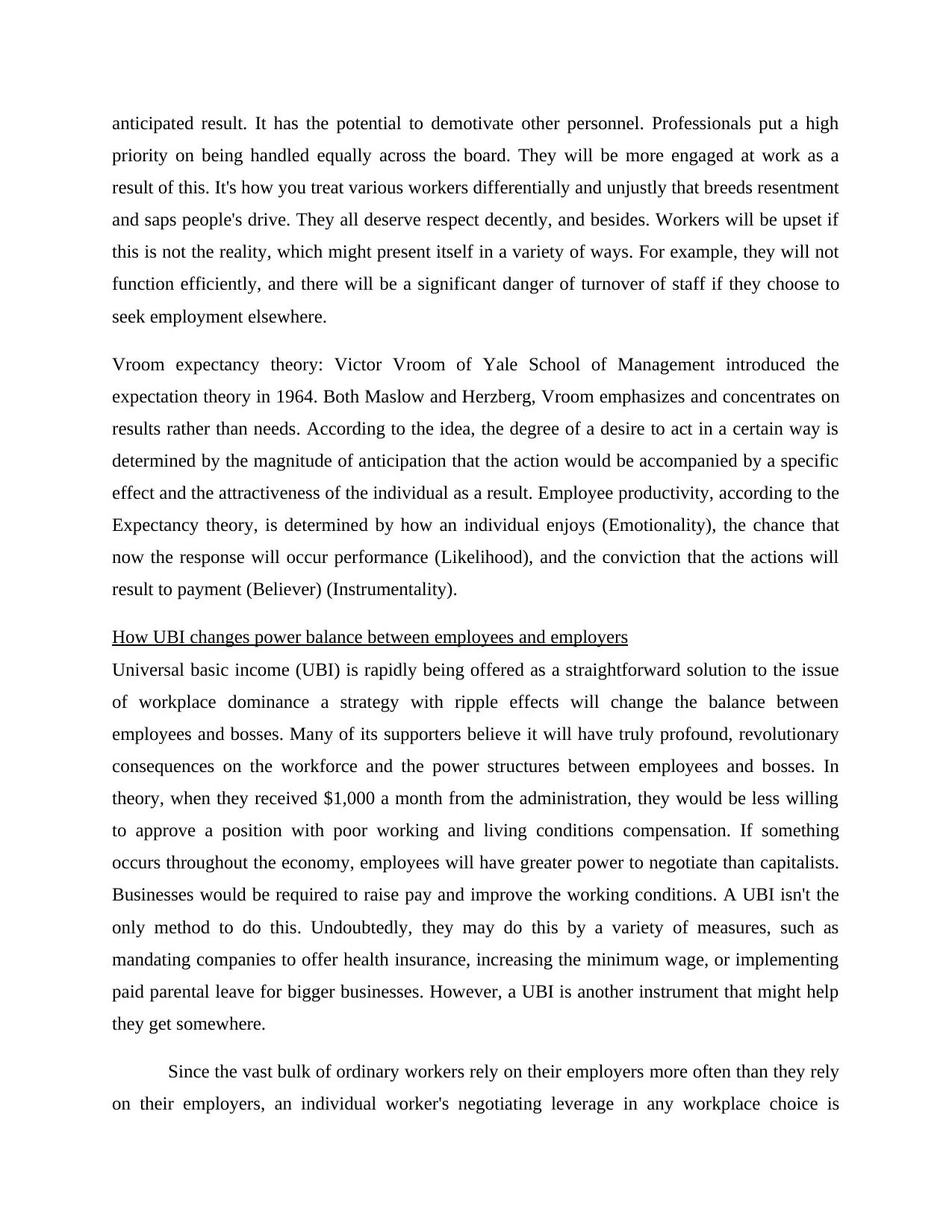
anticipated result. It has the potential to demotivate other personnel. Professionals put a high
priority on being handled equally across the board. They will be more engaged at work as a
result of this. It's how you treat various workers differentially and unjustly that breeds resentment
and saps people's drive. They all deserve respect decently, and besides. Workers will be upset if
this is not the reality, which might present itself in a variety of ways. For example, they will not
function efficiently, and there will be a significant danger of turnover of staff if they choose to
seek employment elsewhere.
Vroom expectancy theory: Victor Vroom of Yale School of Management introduced the
expectation theory in 1964. Both Maslow and Herzberg, Vroom emphasizes and concentrates on
results rather than needs. According to the idea, the degree of a desire to act in a certain way is
determined by the magnitude of anticipation that the action would be accompanied by a specific
effect and the attractiveness of the individual as a result. Employee productivity, according to the
Expectancy theory, is determined by how an individual enjoys (Emotionality), the chance that
now the response will occur performance (Likelihood), and the conviction that the actions will
result to payment (Believer) (Instrumentality).
How UBI changes power balance between employees and employers
Universal basic income (UBI) is rapidly being offered as a straightforward solution to the issue
of workplace dominance a strategy with ripple effects will change the balance between
employees and bosses. Many of its supporters believe it will have truly profound, revolutionary
consequences on the workforce and the power structures between employees and bosses. In
theory, when they received $1,000 a month from the administration, they would be less willing
to approve a position with poor working and living conditions compensation. If something
occurs throughout the economy, employees will have greater power to negotiate than capitalists.
Businesses would be required to raise pay and improve the working conditions. A UBI isn't the
only method to do this. Undoubtedly, they may do this by a variety of measures, such as
mandating companies to offer health insurance, increasing the minimum wage, or implementing
paid parental leave for bigger businesses. However, a UBI is another instrument that might help
they get somewhere.
Since the vast bulk of ordinary workers rely on their employers more often than they rely
on their employers, an individual worker's negotiating leverage in any workplace choice is
priority on being handled equally across the board. They will be more engaged at work as a
result of this. It's how you treat various workers differentially and unjustly that breeds resentment
and saps people's drive. They all deserve respect decently, and besides. Workers will be upset if
this is not the reality, which might present itself in a variety of ways. For example, they will not
function efficiently, and there will be a significant danger of turnover of staff if they choose to
seek employment elsewhere.
Vroom expectancy theory: Victor Vroom of Yale School of Management introduced the
expectation theory in 1964. Both Maslow and Herzberg, Vroom emphasizes and concentrates on
results rather than needs. According to the idea, the degree of a desire to act in a certain way is
determined by the magnitude of anticipation that the action would be accompanied by a specific
effect and the attractiveness of the individual as a result. Employee productivity, according to the
Expectancy theory, is determined by how an individual enjoys (Emotionality), the chance that
now the response will occur performance (Likelihood), and the conviction that the actions will
result to payment (Believer) (Instrumentality).
How UBI changes power balance between employees and employers
Universal basic income (UBI) is rapidly being offered as a straightforward solution to the issue
of workplace dominance a strategy with ripple effects will change the balance between
employees and bosses. Many of its supporters believe it will have truly profound, revolutionary
consequences on the workforce and the power structures between employees and bosses. In
theory, when they received $1,000 a month from the administration, they would be less willing
to approve a position with poor working and living conditions compensation. If something
occurs throughout the economy, employees will have greater power to negotiate than capitalists.
Businesses would be required to raise pay and improve the working conditions. A UBI isn't the
only method to do this. Undoubtedly, they may do this by a variety of measures, such as
mandating companies to offer health insurance, increasing the minimum wage, or implementing
paid parental leave for bigger businesses. However, a UBI is another instrument that might help
they get somewhere.
Since the vast bulk of ordinary workers rely on their employers more often than they rely
on their employers, an individual worker's negotiating leverage in any workplace choice is
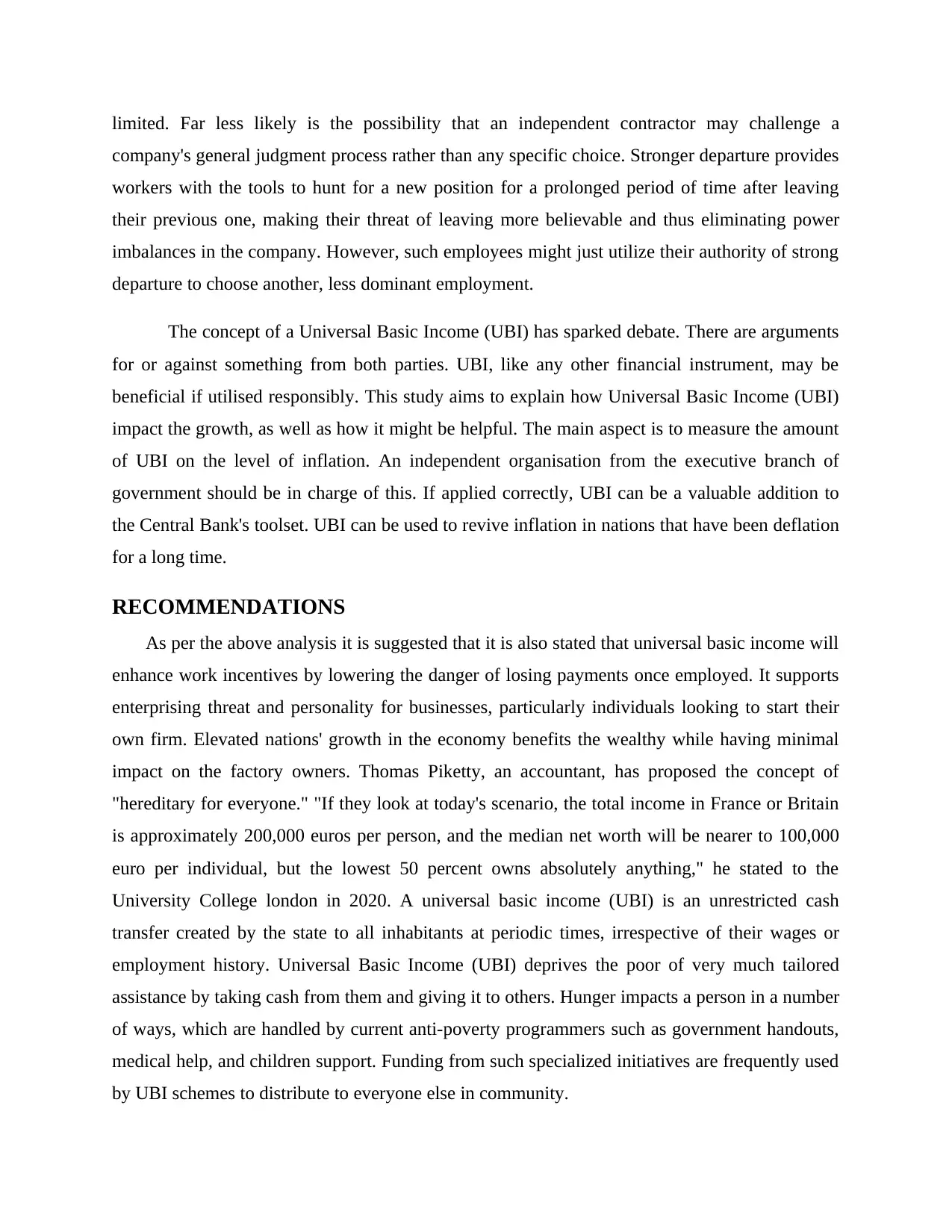
limited. Far less likely is the possibility that an independent contractor may challenge a
company's general judgment process rather than any specific choice. Stronger departure provides
workers with the tools to hunt for a new position for a prolonged period of time after leaving
their previous one, making their threat of leaving more believable and thus eliminating power
imbalances in the company. However, such employees might just utilize their authority of strong
departure to choose another, less dominant employment.
The concept of a Universal Basic Income (UBI) has sparked debate. There are arguments
for or against something from both parties. UBI, like any other financial instrument, may be
beneficial if utilised responsibly. This study aims to explain how Universal Basic Income (UBI)
impact the growth, as well as how it might be helpful. The main aspect is to measure the amount
of UBI on the level of inflation. An independent organisation from the executive branch of
government should be in charge of this. If applied correctly, UBI can be a valuable addition to
the Central Bank's toolset. UBI can be used to revive inflation in nations that have been deflation
for a long time.
RECOMMENDATIONS
As per the above analysis it is suggested that it is also stated that universal basic income will
enhance work incentives by lowering the danger of losing payments once employed. It supports
enterprising threat and personality for businesses, particularly individuals looking to start their
own firm. Elevated nations' growth in the economy benefits the wealthy while having minimal
impact on the factory owners. Thomas Piketty, an accountant, has proposed the concept of
"hereditary for everyone." "If they look at today's scenario, the total income in France or Britain
is approximately 200,000 euros per person, and the median net worth will be nearer to 100,000
euro per individual, but the lowest 50 percent owns absolutely anything," he stated to the
University College london in 2020. A universal basic income (UBI) is an unrestricted cash
transfer created by the state to all inhabitants at periodic times, irrespective of their wages or
employment history. Universal Basic Income (UBI) deprives the poor of very much tailored
assistance by taking cash from them and giving it to others. Hunger impacts a person in a number
of ways, which are handled by current anti-poverty programmers such as government handouts,
medical help, and children support. Funding from such specialized initiatives are frequently used
by UBI schemes to distribute to everyone else in community.
company's general judgment process rather than any specific choice. Stronger departure provides
workers with the tools to hunt for a new position for a prolonged period of time after leaving
their previous one, making their threat of leaving more believable and thus eliminating power
imbalances in the company. However, such employees might just utilize their authority of strong
departure to choose another, less dominant employment.
The concept of a Universal Basic Income (UBI) has sparked debate. There are arguments
for or against something from both parties. UBI, like any other financial instrument, may be
beneficial if utilised responsibly. This study aims to explain how Universal Basic Income (UBI)
impact the growth, as well as how it might be helpful. The main aspect is to measure the amount
of UBI on the level of inflation. An independent organisation from the executive branch of
government should be in charge of this. If applied correctly, UBI can be a valuable addition to
the Central Bank's toolset. UBI can be used to revive inflation in nations that have been deflation
for a long time.
RECOMMENDATIONS
As per the above analysis it is suggested that it is also stated that universal basic income will
enhance work incentives by lowering the danger of losing payments once employed. It supports
enterprising threat and personality for businesses, particularly individuals looking to start their
own firm. Elevated nations' growth in the economy benefits the wealthy while having minimal
impact on the factory owners. Thomas Piketty, an accountant, has proposed the concept of
"hereditary for everyone." "If they look at today's scenario, the total income in France or Britain
is approximately 200,000 euros per person, and the median net worth will be nearer to 100,000
euro per individual, but the lowest 50 percent owns absolutely anything," he stated to the
University College london in 2020. A universal basic income (UBI) is an unrestricted cash
transfer created by the state to all inhabitants at periodic times, irrespective of their wages or
employment history. Universal Basic Income (UBI) deprives the poor of very much tailored
assistance by taking cash from them and giving it to others. Hunger impacts a person in a number
of ways, which are handled by current anti-poverty programmers such as government handouts,
medical help, and children support. Funding from such specialized initiatives are frequently used
by UBI schemes to distribute to everyone else in community.
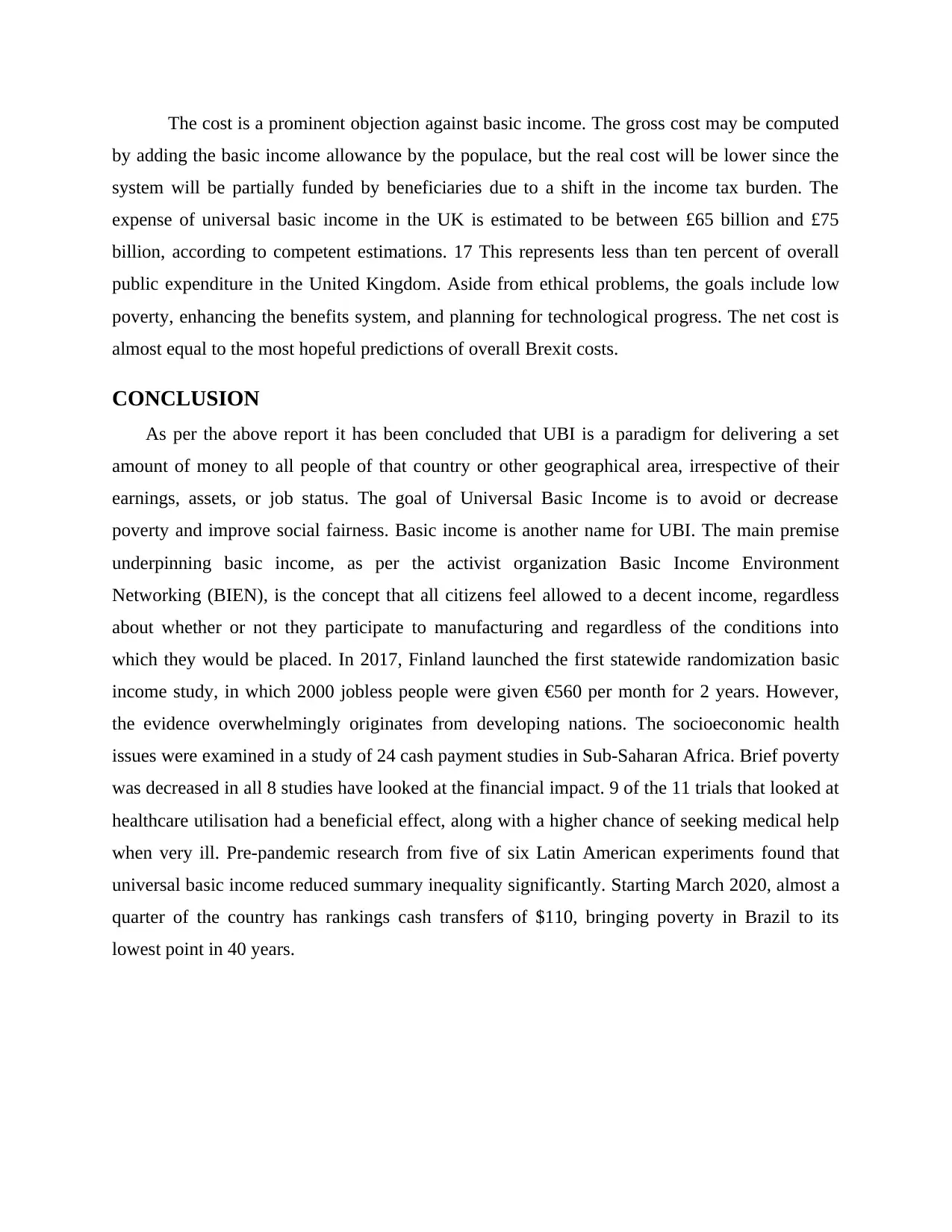
The cost is a prominent objection against basic income. The gross cost may be computed
by adding the basic income allowance by the populace, but the real cost will be lower since the
system will be partially funded by beneficiaries due to a shift in the income tax burden. The
expense of universal basic income in the UK is estimated to be between £65 billion and £75
billion, according to competent estimations. 17 This represents less than ten percent of overall
public expenditure in the United Kingdom. Aside from ethical problems, the goals include low
poverty, enhancing the benefits system, and planning for technological progress. The net cost is
almost equal to the most hopeful predictions of overall Brexit costs.
CONCLUSION
As per the above report it has been concluded that UBI is a paradigm for delivering a set
amount of money to all people of that country or other geographical area, irrespective of their
earnings, assets, or job status. The goal of Universal Basic Income is to avoid or decrease
poverty and improve social fairness. Basic income is another name for UBI. The main premise
underpinning basic income, as per the activist organization Basic Income Environment
Networking (BIEN), is the concept that all citizens feel allowed to a decent income, regardless
about whether or not they participate to manufacturing and regardless of the conditions into
which they would be placed. In 2017, Finland launched the first statewide randomization basic
income study, in which 2000 jobless people were given €560 per month for 2 years. However,
the evidence overwhelmingly originates from developing nations. The socioeconomic health
issues were examined in a study of 24 cash payment studies in Sub-Saharan Africa. Brief poverty
was decreased in all 8 studies have looked at the financial impact. 9 of the 11 trials that looked at
healthcare utilisation had a beneficial effect, along with a higher chance of seeking medical help
when very ill. Pre-pandemic research from five of six Latin American experiments found that
universal basic income reduced summary inequality significantly. Starting March 2020, almost a
quarter of the country has rankings cash transfers of $110, bringing poverty in Brazil to its
lowest point in 40 years.
by adding the basic income allowance by the populace, but the real cost will be lower since the
system will be partially funded by beneficiaries due to a shift in the income tax burden. The
expense of universal basic income in the UK is estimated to be between £65 billion and £75
billion, according to competent estimations. 17 This represents less than ten percent of overall
public expenditure in the United Kingdom. Aside from ethical problems, the goals include low
poverty, enhancing the benefits system, and planning for technological progress. The net cost is
almost equal to the most hopeful predictions of overall Brexit costs.
CONCLUSION
As per the above report it has been concluded that UBI is a paradigm for delivering a set
amount of money to all people of that country or other geographical area, irrespective of their
earnings, assets, or job status. The goal of Universal Basic Income is to avoid or decrease
poverty and improve social fairness. Basic income is another name for UBI. The main premise
underpinning basic income, as per the activist organization Basic Income Environment
Networking (BIEN), is the concept that all citizens feel allowed to a decent income, regardless
about whether or not they participate to manufacturing and regardless of the conditions into
which they would be placed. In 2017, Finland launched the first statewide randomization basic
income study, in which 2000 jobless people were given €560 per month for 2 years. However,
the evidence overwhelmingly originates from developing nations. The socioeconomic health
issues were examined in a study of 24 cash payment studies in Sub-Saharan Africa. Brief poverty
was decreased in all 8 studies have looked at the financial impact. 9 of the 11 trials that looked at
healthcare utilisation had a beneficial effect, along with a higher chance of seeking medical help
when very ill. Pre-pandemic research from five of six Latin American experiments found that
universal basic income reduced summary inequality significantly. Starting March 2020, almost a
quarter of the country has rankings cash transfers of $110, bringing poverty in Brazil to its
lowest point in 40 years.
Paraphrase This Document
Need a fresh take? Get an instant paraphrase of this document with our AI Paraphraser
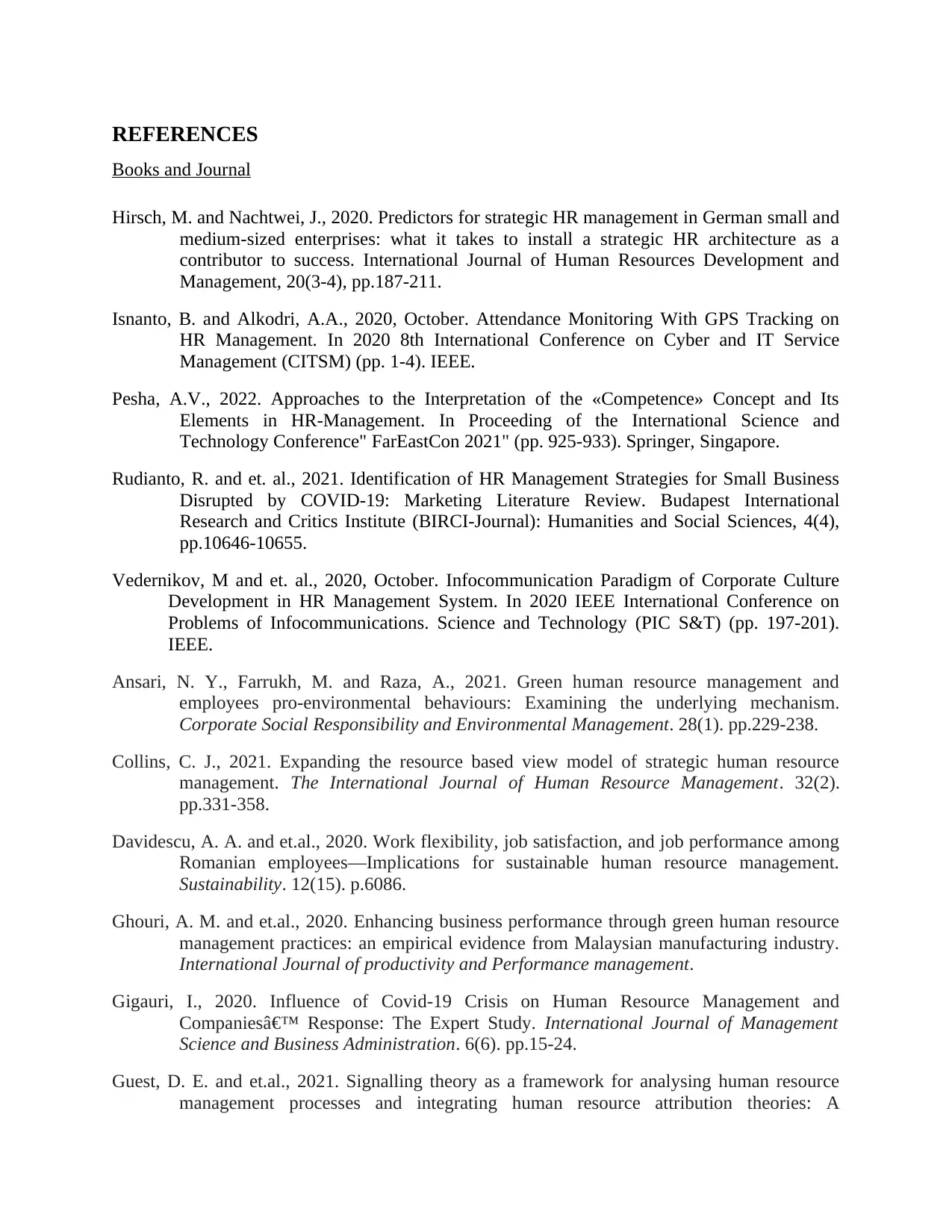
REFERENCES
Books and Journal
Hirsch, M. and Nachtwei, J., 2020. Predictors for strategic HR management in German small and
medium-sized enterprises: what it takes to install a strategic HR architecture as a
contributor to success. International Journal of Human Resources Development and
Management, 20(3-4), pp.187-211.
Isnanto, B. and Alkodri, A.A., 2020, October. Attendance Monitoring With GPS Tracking on
HR Management. In 2020 8th International Conference on Cyber and IT Service
Management (CITSM) (pp. 1-4). IEEE.
Pesha, A.V., 2022. Approaches to the Interpretation of the «Competence» Concept and Its
Elements in HR-Management. In Proceeding of the International Science and
Technology Conference" FarEastСon 2021" (pp. 925-933). Springer, Singapore.
Rudianto, R. and et. al., 2021. Identification of HR Management Strategies for Small Business
Disrupted by COVID-19: Marketing Literature Review. Budapest International
Research and Critics Institute (BIRCI-Journal): Humanities and Social Sciences, 4(4),
pp.10646-10655.
Vedernikov, M and et. al., 2020, October. Infocommunication Paradigm of Corporate Culture
Development in HR Management System. In 2020 IEEE International Conference on
Problems of Infocommunications. Science and Technology (PIC S&T) (pp. 197-201).
IEEE.
Ansari, N. Y., Farrukh, M. and Raza, A., 2021. Green human resource management and
employees pro‐environmental behaviours: Examining the underlying mechanism.
Corporate Social Responsibility and Environmental Management. 28(1). pp.229-238.
Collins, C. J., 2021. Expanding the resource based view model of strategic human resource
management. The International Journal of Human Resource Management. 32(2).
pp.331-358.
Davidescu, A. A. and et.al., 2020. Work flexibility, job satisfaction, and job performance among
Romanian employees—Implications for sustainable human resource management.
Sustainability. 12(15). p.6086.
Ghouri, A. M. and et.al., 2020. Enhancing business performance through green human resource
management practices: an empirical evidence from Malaysian manufacturing industry.
International Journal of productivity and Performance management.
Gigauri, I., 2020. Influence of Covid-19 Crisis on Human Resource Management and
Companies’ Response: The Expert Study. International Journal of Management
Science and Business Administration. 6(6). pp.15-24.
Guest, D. E. and et.al., 2021. Signalling theory as a framework for analysing human resource
management processes and integrating human resource attribution theories: A
Books and Journal
Hirsch, M. and Nachtwei, J., 2020. Predictors for strategic HR management in German small and
medium-sized enterprises: what it takes to install a strategic HR architecture as a
contributor to success. International Journal of Human Resources Development and
Management, 20(3-4), pp.187-211.
Isnanto, B. and Alkodri, A.A., 2020, October. Attendance Monitoring With GPS Tracking on
HR Management. In 2020 8th International Conference on Cyber and IT Service
Management (CITSM) (pp. 1-4). IEEE.
Pesha, A.V., 2022. Approaches to the Interpretation of the «Competence» Concept and Its
Elements in HR-Management. In Proceeding of the International Science and
Technology Conference" FarEastСon 2021" (pp. 925-933). Springer, Singapore.
Rudianto, R. and et. al., 2021. Identification of HR Management Strategies for Small Business
Disrupted by COVID-19: Marketing Literature Review. Budapest International
Research and Critics Institute (BIRCI-Journal): Humanities and Social Sciences, 4(4),
pp.10646-10655.
Vedernikov, M and et. al., 2020, October. Infocommunication Paradigm of Corporate Culture
Development in HR Management System. In 2020 IEEE International Conference on
Problems of Infocommunications. Science and Technology (PIC S&T) (pp. 197-201).
IEEE.
Ansari, N. Y., Farrukh, M. and Raza, A., 2021. Green human resource management and
employees pro‐environmental behaviours: Examining the underlying mechanism.
Corporate Social Responsibility and Environmental Management. 28(1). pp.229-238.
Collins, C. J., 2021. Expanding the resource based view model of strategic human resource
management. The International Journal of Human Resource Management. 32(2).
pp.331-358.
Davidescu, A. A. and et.al., 2020. Work flexibility, job satisfaction, and job performance among
Romanian employees—Implications for sustainable human resource management.
Sustainability. 12(15). p.6086.
Ghouri, A. M. and et.al., 2020. Enhancing business performance through green human resource
management practices: an empirical evidence from Malaysian manufacturing industry.
International Journal of productivity and Performance management.
Gigauri, I., 2020. Influence of Covid-19 Crisis on Human Resource Management and
Companies’ Response: The Expert Study. International Journal of Management
Science and Business Administration. 6(6). pp.15-24.
Guest, D. E. and et.al., 2021. Signalling theory as a framework for analysing human resource
management processes and integrating human resource attribution theories: A
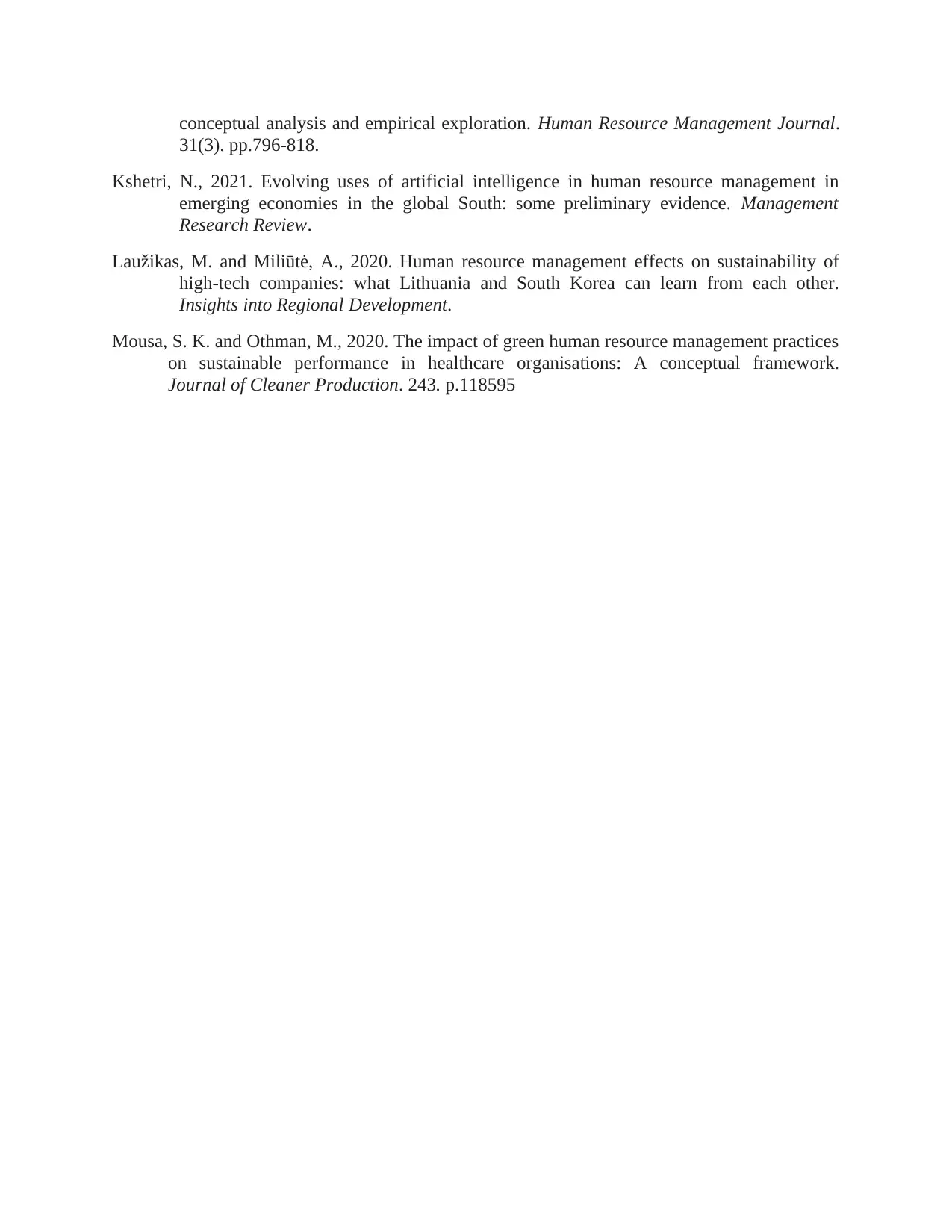
conceptual analysis and empirical exploration. Human Resource Management Journal.
31(3). pp.796-818.
Kshetri, N., 2021. Evolving uses of artificial intelligence in human resource management in
emerging economies in the global South: some preliminary evidence. Management
Research Review.
Laužikas, M. and Miliūtė, A., 2020. Human resource management effects on sustainability of
high-tech companies: what Lithuania and South Korea can learn from each other.
Insights into Regional Development.
Mousa, S. K. and Othman, M., 2020. The impact of green human resource management practices
on sustainable performance in healthcare organisations: A conceptual framework.
Journal of Cleaner Production. 243. p.118595
31(3). pp.796-818.
Kshetri, N., 2021. Evolving uses of artificial intelligence in human resource management in
emerging economies in the global South: some preliminary evidence. Management
Research Review.
Laužikas, M. and Miliūtė, A., 2020. Human resource management effects on sustainability of
high-tech companies: what Lithuania and South Korea can learn from each other.
Insights into Regional Development.
Mousa, S. K. and Othman, M., 2020. The impact of green human resource management practices
on sustainable performance in healthcare organisations: A conceptual framework.
Journal of Cleaner Production. 243. p.118595
1 out of 15
Related Documents
Your All-in-One AI-Powered Toolkit for Academic Success.
+13062052269
info@desklib.com
Available 24*7 on WhatsApp / Email
![[object Object]](/_next/static/media/star-bottom.7253800d.svg)
Unlock your academic potential
© 2024 | Zucol Services PVT LTD | All rights reserved.





